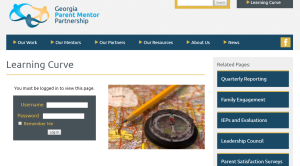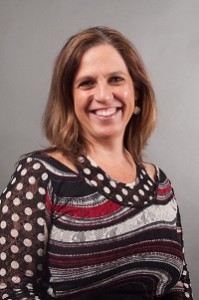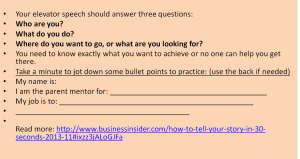
Module 1 – New Mentors
Posted on June 10, 2016, by GAPMP
Module 1 – New Mentors
So, you got the job as parent mentor. Congratulations! You have just entered into a partnership where you will be able to take the knowledge and advocacy that you have needed for your own child (or children) and use those tools to help other families and school system staff as well. You might feel rarin’ to go, but, you are not really sure about what you are supposed to do in this new role. That is why we have developed this learning module for first year (or rookie) mentors.
What you will learn:
Mission and Vision of the Georgia Parent Mentor Partnership (GaPMP)
History of the GaPMP
GaPMP Leadership and Community
Taking on Your New Role
Mission and Vision of the Georgia Parent Mentor Partnership (GaPMP)
- Mission Statement: Build effective family, school and community partnerships which lead to greater student achievement for all students at risk particularly those with disabilities.
- Vision Statement: Parent mentors and special education administrators will lead the way in Georgia to bridge the gap between home, school and community partnerships.
History of the GaPMP
The Partnership, started in 2002 by Phil Pickens, Special Education Director, Georgia Department of Education, (GaDOE), with Family Engagement Specialist Patti Solomon and a small group of parents and administrators, now boasts more than 100 parent mentors helping families raising children with learning, behavioral and/or physical challenges. Parent Mentors have charted more than one million contacts.
The GaPMP is supported by the Division for Special Education Services and Supports (DSESS). The parent leaders, moms and dads of children with disabilities, are hired by local school districts, state schools and the Department of Juvenile Justice to work with families, school teams, teachers, and the community.
The goal is to build a bridge of communication between home and school that leads to more successful outcomes for students. Parent Mentors partner with families to increase their engagement in education, address individual concerns and also to support initiatives designed to improve all children’s achievement levels.
Parent Mentor work is locally driven, designed to meet the needs of its unique area.
The DSESS hosts an annual Kickoff Conference (usually in September) and regional meetings four times a year in additional to various trainings via webinar and online tools throughout the school year.
GaPMP Leadership and Community
There are several people in the Georgia Department of Education’s Division for Special Education Services and Supports who help run the GaPMP.
The first person to know is a former Gwinnett County Parent Mentor who now runs the partnership:Anne Ladd 404-657-7328 or aladd@doe.k12.ga.us
Some other people from the GaDOE you may want to take note of:
Richard Woods, State Superintendent of Schools
Zelphine Smith-Dixon, Director, Division for Special Education Services and Supports
Jamila Pollard, Program Manager
Sharon Jones, Family Engagement Specialist and former Cherokee County Parent Mentor
The overriding philosophy of the GaPMP is to include its parent mentor members in the shared leadership of the partnership. This is accomplished through participation in a variety of ways including the Leadership Council and committees.
The Leadership Council membership is made up of seasoned mentors who understand the mission and vision of the GaPMP and wish to help strengthen and improve this initiative.
Region Representatives
The GaPMP consists of six regions served by a regional representative. The “region rep” helps mentors with their quarterly reports and hosts 4 regional meetings each year.
Advisors – These are special education directors or administrators
Alecia Segursky, Gordon
Charity Roberts, Pioneer RESA GLRS
The GaPMP website www.parentmentors.org offers general information about parent mentor programs and other useful topics.
Send a professional photo and contact information to info@parentmentors.org to be added the Find A Mentor pages. This is important! Your Find A Mentor page is like your business card on the GaPMP website.
 You will also want to refer to the Learning Curve, which offers mentors access to the forms, documents and other resources you will need to complete annual reporting requirements and, also find shared materials you can use for your work.
You will also want to refer to the Learning Curve, which offers mentors access to the forms, documents and other resources you will need to complete annual reporting requirements and, also find shared materials you can use for your work.
The GaPMP consists of six regions served by a regional representative who will help mentors with mandatory accountability reporting and quarterly contacts
Remember, you can find other mentors by simply going to the Find a Mentor pages on the website and typing the county in the search tab. That will connect you to the mentor’s page if there is one.
Collaboration outside the GaPMP
- Babies Can’t Wait – Skilled Credentialed Early Interventionists
- Bright from the Start: Georgia Department of Early Care and Learning
- Center for Leadership in Disabilities at Georgia State University
- Georgia Council on Developmental Disabilities
- Georgia Department of Behavioral Health and Developmental Disabilities
- Georgia Department of Education, Division for Special Education Supports and Services; Parent Mentor Partnership
- Georgia Family Connection Partnership
- Institute on Human Development and Disability at the University of Georgia
- Parent to Parent of GA – Georgia’s Parent Training Information Center (PTI)
And others such as:
Title I
After School programs
Ga. Vocational Rehabilitation
Local Support groups or Navigator teams
School Social Workers
Local Respite/ Disability services agencies
Churches (especially if they have a Sunday School class for members with special needs)
Special Olympics
Taking on Your New Role
As an involved parent, you may know lots of people in your school district. But, as a parent mentor, you will be wearing a new hat and you will need to spend this year getting to know people, learning about what your school district is like from the inside (as a part of school district staff) and, helping staff and leaders in your school district learn about what parent mentors do.
One of the most important things you can do is make sure you spend some time early on with your director. Develop a working relationship (as time and scheduling allows) with your director.
Locate office space, set up the office, telephone, computer, email etc. Facilities vary widely based on factors such as the district size, tax base, location, demographics, etc. It is generally expected that there will be office space in the district for the Parent Mentor; it is helpful if it is near other staff who may be working with families. It is best if parents can call a private voicemail message box so parents may call you directly.
Read the school district’s Policies & Procedures Manual. Discuss the local district’s policies and procedures for: attendance, work hours, personnel actions, phone and email use, dress codes, internet use, travel approval, reporting suspected child abuse, and expense reporting. Some of it may apply only to full time employees, but the information will still be useful. You now represent your school district and professional conduct is expected.
Discuss professional protocols with your Special Education Director. For example, how are media contacts to be managed, who needs to approve letters, brochures, or other materials before they are distributed, who approves travel requests, how is time documented, the dress code, managing schedule changes, reporting deadlines, travel and expense reports, call-in procedures etc.
Parent Mentors and their directors are responsible for attending the annual Kickoff Conference (usually held in September) and four regional meetings each year. You are required to complete several documents: Quarterly Contact Reports, Pre and Post Surveys, Quarterly Reports and End of Year Surveys. *Learn about these in more detail by completing the Reporting and Responsibilities module.
Here are some other helpful hints:
Find your own “mentor” within your department, someone who can introduce you to key people in the district. If possible, work with the director and this local mentor to make a plan for introductions.
Focus on building the important relationships and partnerships, beginning with everyone in your department and moving out into the schools, the district, and the community.
Confidentiality safeguards are important to remember. As an employee, you may not talk about any students with disabilities with anyone unless that person also works with that student. This includes others within the school district, family or friends. It’s easy to get excited about your work and accidently share confidential information. Be careful!!
Boundary setting is critical. As a professional and a school district employee, you must also stay within the boundaries of your job. You can give advice and suggestions as a parent to other parents, but you are not a counselor, teacher, lawyer, or psychologist. You have an important role as a parent who mentors other parents, but it is important to honor the boundaries and not stray into another’s role.
Reporting possible or suspected child abuse: Find out what your school district’s procedures are for reporting suspected child abuse. By state law you are a mandated reporter: http://oca.georgia.gov/mandated-reporter
Respect co-workers by ensuring that you:
Are prepared for meetings with talking points and questions
Arrive on time for meetings and be sure your meetings begin and end on time
Wear district name tag/carry business cards with you
Dress appropriately
Communicate in an open and responsive manner
Respect different perspectives and learn from them
Honor each other’s expertise and experience
Safeguard confidentiality
Maintain accountability at the local and state level
If you are the first parent mentor to serve in your school district, you will need to help people understand your role.
12 Ways to Introduce Yourself
- Introductions at Central Office Staff meetings and Coordinator, Lead Teacher meetings.
- Find opportunities to tell your individual story to central office staff so colleagues can understand the challenges a parent faces and feels raising a child with a disability.
- Your local special education director can send a letter of introduction to school administrators, counselors, teachers, therapists, psychologists, school district partners, etc., describing your role and providing your contact information.
- Create or customize an existing Parent Mentor Brochure with your information. With your Director’s approval, get a sufficient quantity printed for distribution. (Check the Parent Mentor “Learning Curve” online for samples of existing introductory brochures).
- Meet with principals, counselors, and social workers in each school. Plan visits based on your district’s goals and priorities.
- Attend family and community meetings and listen. Make sure you introduce yourself at the meetings.
- Meet with individual school PTA/PTOs. Determine if ALL parents are being included and how you can help. Contact the partners on your community map. Call the GAP2P representative for your area and introduce yourself.
- Build relationships and partnerships with leaders to work towards including ALL parents in their activities – especially Title I and English Language Learners programs.
- Provide information about the Parent Mentor program to local newspapers, with prior approval from your Director and district Media Coordinator/Public Relations Director. Learn the approval protocol for any flyer, news item etc. and never distribute any information without first obtaining approval according to the local policy. Also find out what to do if a member of the media contacts you directly. Often you will need to refer the call to the Media Coordinator/Public Relations Director before responding to any requests for information or interviews.
- PTA/PTO newsletters, again with prior approval as required by your school district.
- Mail an introduction letter to every family with a student who has an IEP and/or send a letter to every teacher. By now you know you need prior approval to send the introductory letter.
- Distribute your contact information to intake staff, social workers, psychologists, counselors and diagnosticians to be given to parents at the time of referral or evaluation.
Some things you are NOT in your role as a parent mentor
A paid advocate
A watchdog
An attorney
A diagnostician or clinical psychologist
A police officer
A DFCS Childrens Services Investigator
A teacher or principal

 Learning Curve
Learning Curve


